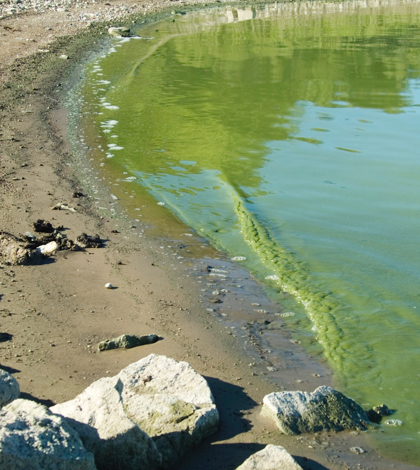Now that summer is nearly here and temperatures are rising, the State Water Resources Control Board (SWRCB) is asking the public to be careful around harmful algal blooms (HABs) in freshwater rivers, lakes, and reservoirs. These blooms can look like paint floating on the water, can cause illness and are especially harmful to children and pets.
Last year more than 200 of these blooms were reported across the state.
Most harmful algal blooms are formed by cyanobacteria, small microbes that live in nearly every habitat on land and in the water. Increased water temperatures, slow moving water, and excessive nutrients cause cyanobacteria to rapidly multiply and form these harmful blooms.
Cyanobacteria are capable of producing toxins, which have the potential to harm the environment, people, pets, wildlife or livestock. Dogs and children are most likely to be affected because of their smaller body size, increased potential to swallow water while swimming and tendency to stay in the water longer. Recreational exposure to cyanobacteria and associated toxins can cause eye irritation, skin rash, mouth ulcers, vomiting, diarrhea and cold and flu-like symptoms.
Dogs are susceptible because they tend to drink while in the water and lick their fur afterward,
increasing their risk of exposure and illness. Symptoms with animals include vomiting or
diarrhea, lethargy, abnormal liver function test results, difficulty breathing, foaming at the
mouth, muscle twitching and sometimes death.
SWRCB recommends that people:
- Follow all instructions on posted advisories if present
- Avoid algae and scum in the water and on the shore
- Keep an eye on children and pets
- If you think a harmful algal bloom is present, do not let pets and other animals go into or drink the water or eat scum/algal accumulations on the shore
- Don’t drink the water or use it for cooking
- Wash yourself, your family and your pets with clean water after water play
- If you catch fish, throw away guts and clean fillets with tap water or bottled water before cooking
- Avoid eating shellfish if you think a harmful algal bloom is present
Get medical treatment immediately if you think that you, your pet, or livestock has gotten sick after going in the water. Be sure to alert the medical professional to the possible contact with cyanobacteria. Also, make sure to contact the local county public health department.
To report a bloom, contact the SWRCB at [email protected] or 1-844-729-6466 (toll free).
 California Water News Daily Your Source For Water News in California
California Water News Daily Your Source For Water News in California


